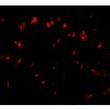SPRED1 Rabbit Polyclonal Antibody
Other products for "SPRED1"
Specifications
| Product Data | |
| Applications | IF, IHC, WB |
| Recommended Dilution | WB: 1 - 2 ug/mL, ICC: 2.5 ug/mL, IF: 20 ug/mL |
| Reactivities | Human, Mouse, Rat |
| Host | Rabbit |
| Isotype | IgG |
| Clonality | Polyclonal |
| Immunogen | Spred1 antibody was raised against a 14 amino acid peptide near the center of the human Spred1. |
| Formulation | PBS containing 0.02% sodium azide. |
| Concentration | 1ug/ul |
| Purification | Affinity chromatography purified via peptide column |
| Conjugation | Unconjugated |
| Storage | Store at -20°C as received. |
| Stability | Stable for 12 months from date of receipt. |
| Gene Name | sprouty related EVH1 domain containing 1 |
| Database Link | |
| Background | The Ras-MAP kinase pathway is essential for the differentiation of neuronal cells and myocytes; it is inhibited by Spred1, a member of the Sprouty family of proteins. Spred1 acts by suppressing the phosphorylation and activation of Raf. The Spred proteins have also been implicated in the negative feedback regulation of FGF signaling in embryogenesis and angiogenesis. Further studies have shown that expression levels of Spred1 and Spred2 proteins are inversely correlated with the incidence of tumor invasion and metastasis in human hepatocellular carcinoma (HHC), suggesting that these proteins could be useful as prognostic factors and therapeutic targets in HCC. Defects in this gene are a cause of neurofibromatosis type 1-like syndrome (NFLS). This Spred1 antibody is predicted to have no cross-reactivity to Spred2 or Spred3. |
| Synonyms | hSpred1; NFLS; PPP1R147; spred-1 |
| Reference Data | |
| Protein Pathways | Jak-STAT signaling pathway |
Documents
| Product Manuals |
| FAQs |
{0} Product Review(s)
0 Product Review(s)
Submit review
Be the first one to submit a review
Product Citations
*Delivery time may vary from web posted schedule. Occasional delays may occur due to unforeseen
complexities in the preparation of your product. International customers may expect an additional 1-2 weeks
in shipping.






























































































































































































































































 Germany
Germany
 Japan
Japan
 United Kingdom
United Kingdom
 China
China





